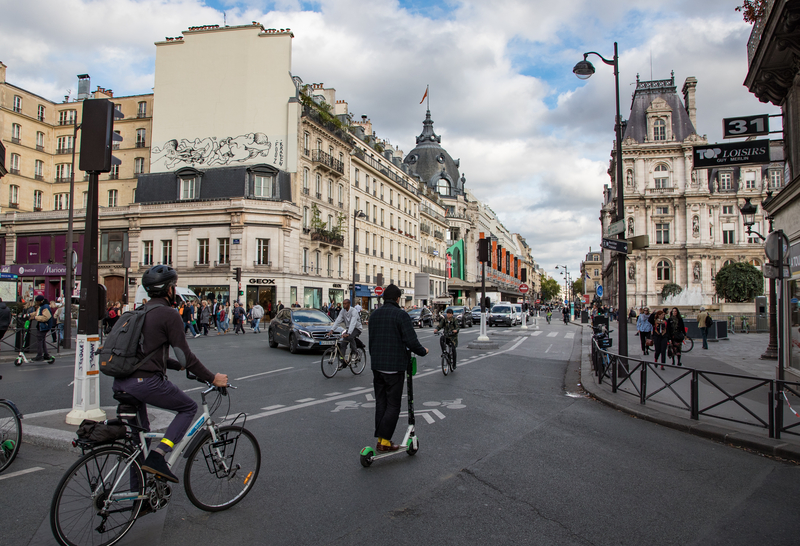
Photo: dreamstime_s_185026257
Paris votes to ban rental e-scooters – what does it mean for other cities?
04 April 2023
by Christopher Carey
Voters in Paris have opted to ban rental e-scooters from the streets of the French capital.
Almost 90 percent of those who voted were in favour of banning the vehicles, according to the City of Paris website, and while the referendum was non-binding, city authorities have vowed to follow Sunday’s result.
Of the 1.38 million people on the city’s electoral register, just over 103,000 took part in the ballot – or eight percent of eligible voters.
“I’m committed to respecting the choice of voters, purely and simply,” Paris Mayor Anne Hidalgo said on Sunday.
“[E-scooter rental is] very expensive – €5 for 10 minutes – it’s not very sustainable, and above all, it’s the cause of a lot of accidents.”
In an interview with Agence France-Presses last week, the mayor also said e-scooters were a source of “tension and worry” for Parisians, and that a ban would “reduce nuisance” in public spaces.
The ban will not affect privately owned e-scooters, of which 700,000 were sold in France last year.
Problems
The micromobility devices have been a continued source of controversy in the French capital since their introduction, with residents complaining about illegal riding on pavements or abandoned and poorly parked vehicles.
In September, officials warned the three companies operating the city’s 15,000 scooters – Lime, Dott and Tier – that their licences would be under threat if they failed to limit reckless riding and other “misuses”.
Two months later, the three operators came up with a number of suggested improvements, including equipping the scooters with licence plates that would allow easier tracking of riders running a red light or travelling in pairs on the single-person vehicles – both common violations.
But dumped scooters have also become a significant problem in Paris, with many being found scattered throughout the city’s parks and squares.
In 2021, 24 people died in e-scooter-related accidents in France, including one in Paris.
Operators
Rental electric scooters have operated in Paris since 2018, but following complaints about their deployment, the city restricted the number of operators to three – Lime, Dott and Tier – in 2020.
It gave the firms a three-year contract, required that scooters’ speed be capped at 20km/h and imposed designated scooter parking areas.
Operators in turn have offered further regulations, including checking users were over 18, affixing licence plates so police could identify traffic offenders and limiting the devices to one passenger.
In a bid to get people out to vote, Lime and Tier offered free rides all day on Sunday and also ran an extensive social media campaign.
But the resounding defeat now means Paris will bid au revoir to rental e-scooters in September.
“The results of the Paris referendum are a big disappointment,” said Lawrence Leuschner, CEO & Co-Founder, TIER.
“With a turnout of less than eight percent, the vote to ban e-scooters in the capital was far from representative of the views of all Parisians.
“Since 2019, Paris has been a pioneer for the regulation of shared e-scooters – they successfully managed to launch a tender under the newly adopted legislative framework, to limit the number of operators and scooters, and to significantly reduce the frictions from the early days of our industry.
“This visionary approach inspired hundreds of other cities around the world.
“Unfortunately, this journey has come to a premature end with the decision to remove these promising and popular vehicles from central Paris at the end of August.”
What this means
Cities have been tightening regulations on e-scooters, limiting the number of operators as well as speed and where they can park.
Last year, Stockholm almost halved the number of scooters available for rent – from around 23,000 to 12,000 – and banned pavement parking.
In June 2022, Rome announced new rules on the use of e-scooters after a number of serious incidents in the city. Authorities restricted e-scooter use to adults with an ID and clamped down on people riding on pavements and scooters with more than one person on board.
A top speed limit of 20 kmph, or 6 kmph in pedestrian areas was also set, along with restrictions on parking, with users required to take a photograph of their vehicle and send it to the operator at the end of their journey.
Other cities, including the Norwegian capital Oslo and the Lithuanian capital Vilnius, have also banned rentals at night in certain areas in an attempt to reduce crashes.
The implications of the Paris vote may well prove to be far-reaching, with many cities monitoring how e-scooters fit into the mobility ecosystem.
Speaking to Cities Today, David Zipper, Visiting Fellow at the Harvard Kennedy School’s Taubman Center for State and Local Government, said: “Because Paris is already so multimodal, scooter trips there are likely to replace walking, biking or transit rather than car trips.
“In autocentric US cities, that’s not the case – many studies have shown that [over] 30 percent of US shared scooter trips would have otherwise happened by car, which makes them far more valuable from a climate perspective than they would be in Paris.”
Peter Griffiths, Global Urban Futures Expert at BABLE Smart Cities, said: “Getting a political mandate to remove or change transport freedoms will certainly require some level of voting so we should expect more voting, but it’s important we don’t make that just about scooters.
“We don’t necessarily need scooters to decarbonise, but we definitely need a different pattern of mobility.
“E-scooters provide a useful opportunity to test that but we should expect cities to come up with other solutions too and for the public sector to want more control over this.
“That will mean some cities will move to further restrict shared e-scooters, as Paris did ahead of the vote.”
Image:© Gabe9000c








